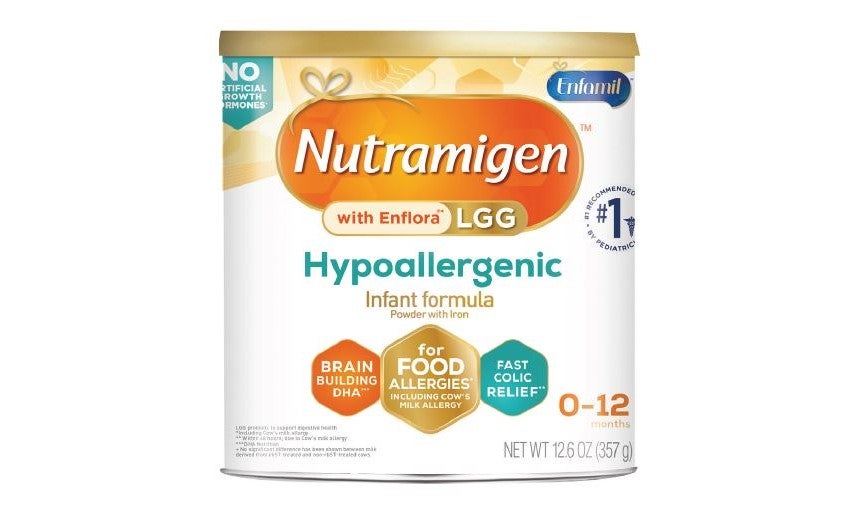
Reckitt Benckiser has begun a strategic review over the future of its Mead Johnson infant-formula business, which the UK group described as “non-core”.
Mead Johnson, acquired in 2017 for $17.9bn, sits within Reckitt’s nutrition division, the smallest revenue earner behind the hygiene and health units.

Discover B2B Marketing That Performs
Combine business intelligence and editorial excellence to reach engaged professionals across 36 leading media platforms.
London-listed Reckitt also said today (24 July) it will “seek to exit” a selection of homecare brands such as Air Wick and Calgon as the group cut its full-year organic growth outlook range by one percentage point.
While CEO Kris Licht did not make the same “exit” commitment to Mead Johnson and nutrition, a potential sale was not ruled out. However, analysts suggested any disposal will be constrained by ongoing litigation in the US related to the alleged health risks to babies from consuming Enfamil Premature 24 infant formula.
“The Mead Johnson Nutrition business, with its market-leading brands of Enfamil and Nutramigen, is now non-core and Reckitt will consider all strategic options to maximise shareholder value,” the company said.
Nutrition was also excluded from a more generalised comment in today’s statement from Licht.

US Tariffs are shifting - will you react or anticipate?
Don’t let policy changes catch you off guard. Stay proactive with real-time data and expert analysis.
By GlobalData“Today we announce an important step forward to firmly establish Reckitt as a world-class consumer health and hygiene company, with one of the strongest growth and margin profiles in the industry,” he said.
“Our core portfolio of market-leading ‘powerbrands’ and simpler, more effective organisation, position us to better serve our consumers and customers. This will deliver attractive long-term value creation for Reckitt’s shareholders through our earnings model and cash returns.”
David Hayes, an analyst at US investment bank Jefferies, suggested the announcements “may be seen as a defensive and [a] somewhat vague restructuring plan”, given the reduction in growth guidance to 1-3% from 2-4% previously.
“The Mead Johnson strategic review continues to be limited for now, in our view, given the litigation uncertainty that is likely to persist until 2Q-25 earliest,” he added in a research note.
Meanwhile, analysts at Barclays, led by Warren Ackerman, suggested the restructuring is “likely to be well received and should more than offset any disappointment over nudging down topline guidance”.
The Barclays analysts wrote: “Non-core assets tend to ultimately be exited, although the litigation issues around infant formula will likely make a sale challenging until they have been resolved.”
Reckitt is facing the prospect of incurring as much as £2bn ($2.5bn) in damages related to the life-threatening necrotizing enterocolitis (NEC) disease, which effects premature babies.
In March, a US court in Illinois awarded $60m in damages to a mother of a baby that died from NEC after being fed Enfamil Premature 24. The judge ruled Mead Johnson was “negligent” because the company failed to warn mothers of the risks from NEC as a result of consuming that type of formula.
At the time, Barclays suggested there could be around 400 other cases pending in the US.
Reckitt said in its first-half results statement, also issued today: “The group faces contingent liabilities in respect of product liability actions filed against Mead Johnson entities relating to necrotising enterocolitis.
“A trial in one of these actions is currently scheduled to begin on 30 September 2024 in St. Louis, Missouri.”
Licht attributed the growth downgrade to the tornado that inflicted damage on Mead Johnson’s baby food warehouse facility in Mount Vernon, Virginia, earlier this month.
Reckitt’s share price was flat at 4,410 pence as of 11:15am BST in London.
The nutrition division generated sales of £1.17bn in the first half, down 9% on a like-for-like basis. Group revenue rose 0.8% to £7.17bn.
Nutrition volumes fell 9% with price/mix flat. Second-quarter sales and volumes were also down by 8.1% and 8.6%, respectively, with price/mix a positive 0.5%.
Second-quarter group volumes dropped 2.2%, while price/mix rose 2.2%.
Reckitt now expects infant-formula sales to decrease by low double-digits this year, compared to a mid-to-high single-digit decline previously.



